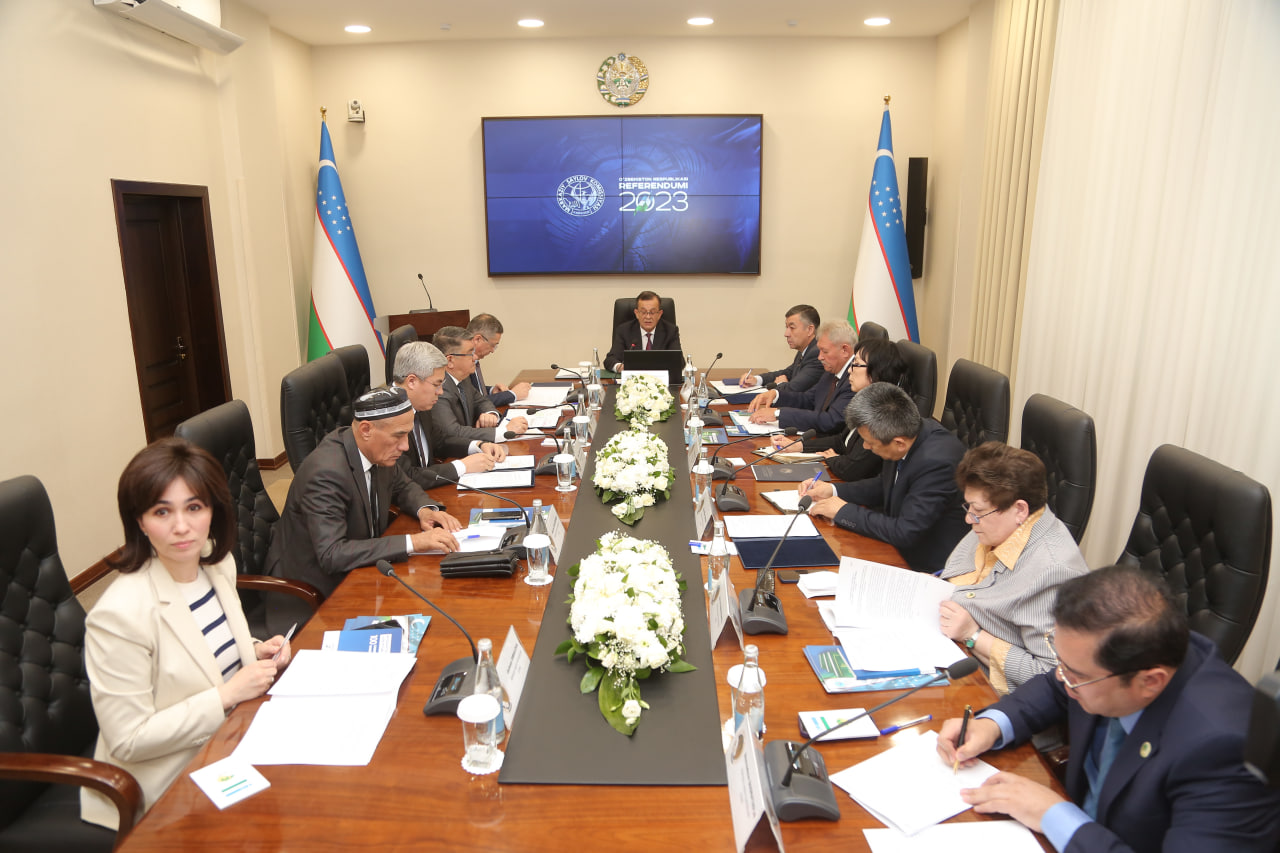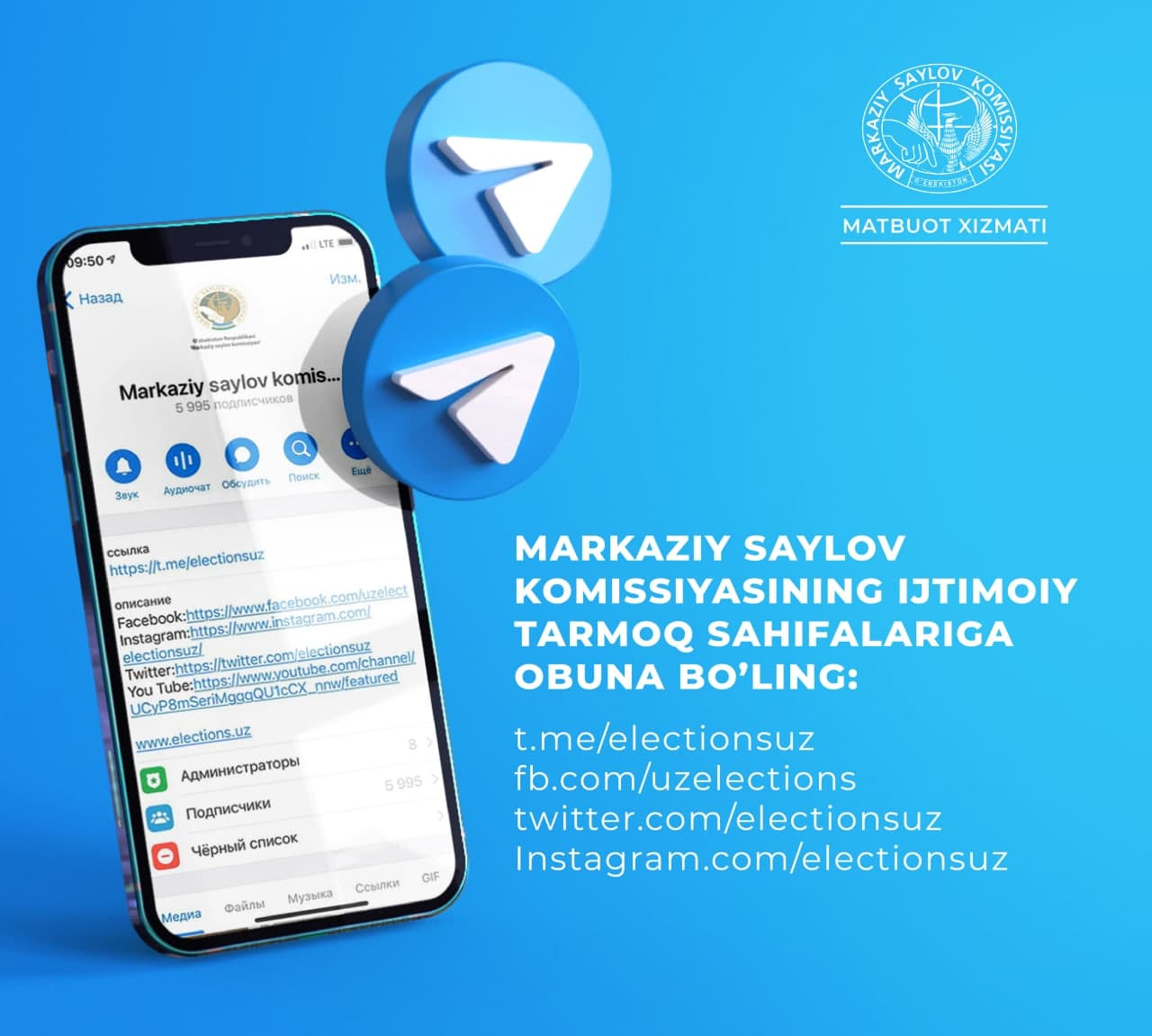 3321
3321
The criteria and standards for holding democratic, free, fair elections were reflected in the new election legislation, as well as in a number of other legal documents. The Election Code has become a real embodiment of Uzbekistan’s efforts to ensure the basic principles of democratic elections enshrined in international documents.
As an OSCE participating State, Uzbekistan respects the right of its citizens to take part in governing the country directly or through representatives freely elected by them in an honest election process. In our country, legal guarantees are provided for competition between political parties on the basis of equality before the Law, conditions are created for an election campaign in an atmosphere of transparency and honesty, candidates and voters to freely express their views and assessments, to freely discuss them and vote freely, and the presence of national and foreign observers and more.
The period of pre-election agitation is the peak of the election campaign. At this time, candidates are making the most active efforts to make their programs more recognizable among the public. In practice, election campaign participants have a desire to use the most effective forms and methods of agitation. Modern suffrage in foreign countries is characterized by the introduction of a wide arsenal of electoral technology tools, which involve hundreds of thousands of people: activists and members of election commissions, party leaders, elected candidates, current deputies, law enforcement agencies, the entire judicial system, public organizations, foreign observers. The threat to free and alternative elections is the so-called “dirty” electoral technologies associated with the use of freedom to campaign in order to disseminate slanderous fabrications that incriminate materials about candidates. The election laws of foreign countries, as a rule, very carefully regulate the conduct of the election campaign. Firstly, the timing (and sometimes territory) of the election campaign is clearly set. Secondly, the conditions and procedure for financing the election campaign are determined. So, in a number of countries (USA, Japan, Great Britain) the law establishes the maximum allowable expenses for the election campaign. The law also establishes in most countries the maximum amount of donations from individuals to candidates and parties, determines the size and conditions of possible state subsidies. Campaign financing from anonymous and foreign sources is generally strictly prohibited.
Chapter 9 of the Election Code is devoted to the legal regulation of election agitation. Article 44 describes it as an activity carried out during an election campaign and aimed at encouraging citizens to vote for a particular candidate or political party. The article also determines the beginning of the election agitation. Agitation on election day and the day before the start of voting is not allowed. The main forms of agitation during the election campaign are the holding of election meetings and rallies, posting of election posters and posters, and performances on radio and television. Thus, according to Article 45 of the Election Code, types, forms, methods of election agitation are determined, which are aimed primarily at disseminating information about candidates or calling citizens to participate in elections. At the same time, it is wrong to believe that the dissemination of any information about candidates can be regarded as election campaigning. Such is only the dissemination of information that aims to induce or arouse the desire in voters to vote for or against certain candidates. Therefore, in order to officially recognize a campaign as an election agitation, it is necessary to establish that its holding is aimed at motivating citizens to vote “for” or “against” certain candidates. The subjects of election agitation have the opportunity to conduct agitation in two areas: Support specific candidates or oppose them, urging voters to vote “for” or “against” candidates, respectively. Conduct agitation to persuade voters to persuade to run for election. It is conducted with the aim of ensuring the effectiveness of the will of the voters, since according to the legislation on elections, one of the conditions for recognizing them as having been held is the participation of the number of voters established by law.
Article 46 of the Code established that, during campaigning, equal conditions of access to state media are ensured by free provision of the same airtime and print space. In non-state media, airtime or print space may be allocated in accordance with the law. Terms of payment should be equal and the same for all. The procedure, volume and time of using the media for agitation is determined by the relevant election commission in agreement with political parties. So, on October 5, 2019, the CEC adopted a resolution “On Approving the Regulation on the Procedure for Conducting the Pre-election agitation of Candidates for Deputies to the Legislative Chamber of the Oliy Majlis of the Republic of Uzbekistan, Regional, District and City Kengashes of People’s Deputies”. Often during the pre-election agitation, serious collision of political positions of representatives of various political parties arise. At the same time, some candidates, wishing to increase the agitation effect on voters, are trying to break the boundaries of legally and ethically permissible. Ignoring the established procedure for conducting pre-election agitation can have the most serious consequences for violators. Legislation of many countries provides for pre-election agitation rules, for violation of which may be followed by removal of candidates from registration, and in certain circumstances they may lead to invalidation of elections. Therefore, participants in election campaigns must be well acquainted with the rules of the pre-election agitation and be informed of the rights and guarantees provided to them. Knowing the legal side of the pre-election agitation situation in certain cases will allow candidates to protect themselves from illegal actions by opponents. Given the level of development of democracy in society and the legal awareness of the population, it is necessary to strengthen the participation of the media in the elections, which should begin long before the elections and conditionally divide this process into several stages, each of which serves the realization of certain goals and objectives. The first stage should be aimed at ensuring that voters are fully informed of their rights and obligations in relation to elections. At the second stage, the media should work efficiently, inform citizens on time about the technology for holding elections, explain the procedure for nominating candidates, familiarize the population with their platforms, interact with election commissions, political parties, and citizens' self-government bodies. The third stage should cover issues related to summarizing the conduct of elections, analysis of violations, learning lessons. Improving the technology of the electoral process in Uzbekistan is associated not only with the accumulation of their own experience in conducting elections, but also with the study of world practice in this area. Given the fact that a significant proportion of voters in our country are young people, the issues of educating the electoral culture and activity are of particular relevance. In the elections of December of this year alone, more than two million young citizens of our country who have reached 18 years of election day will first use their constitutional right - the right to vote. In Germany, they teach children about elections since childhood: they play various games related to elections in kindergartens and schools, they make it clear to the child that this is very important for his further adult life. A special system has been created for young people on the Internet, which in the form of a test allows everyone to determine party preferences. Our country has created the conditions for conducting a pre-election agitation in an atmosphere of freedom and honesty, free expression by candidates and voters of their views and assessments, their unhindered discussion and free voting.
Omon Mukhamedzhanov.
Professor of Tashkent State Law University
Doctor of Law.
“Правда востока” newspaper 05.11.2019)






















